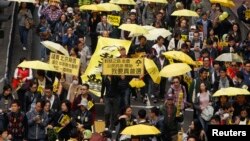Hong Kong activists said despite a lower turnout than expected at a pro-democracy march on Sunday, those who did participate show a continuing support for election reform in the city.
On Sunday, downtown Hong Kong was greeted by the familiar sight of pro-democracy protesters carrying umbrellas and chanting slogans calling for electoral reform in the city.
Organizers had hoped for a turnout of 50,000 but estimated about 13,000 protesters showed up. Police estimated about 8,800 people took part.
It was the first such rally in more than a month, and attracted a diverse crowd who marched behind a banner that read: "Reject fake democracy; we want real universal suffrage."
Student leader
Joshua Wong, an 18-year-old leader of the student demonstrations for democracy, last year became a face of the movement that drew more than 100,000 people at times to the streets.
Wong said there are still many demanding the right to directly vote for the city’s next leader in the 2017 elections.
"I think it’s important for us to show our persistence before the council members vote in the council. We will try our best to fight for true universal suffrage," he said.
Activists said the march is part of a wave of peaceful demonstrations that will take place in the run-up to a legislative vote on Hong Kong’s electoral plans this spring or summer.
Last year, Beijing unveiled new election plans for Hong Kong that would allow direct votes for the city’s chief executive beginning in 2017, but only from a pool of candidates chosen by a committee backed with Beijing loyalists.
Emily Lau, head of Hong Kong’s Democratic Party, said there are some signs that a compromise between democracy protesters and the government can be reached.
“Because there are people from the pro-Beijing camp and even government sources who are coming out to say that they wish to discuss with the legislators from the pro-democracy camp,” Lau said.
“I am not saying that I am optimistic, or this is wishful thinking, but if Beijing doesn't understand that they could face very serious consequences, I think it’s a good thing,” she said. “They need to know that it would be very bad, not just for Hong Kong, or that Hong Kong would be ungovernable, but that from Beijing’s point of view it would look quite bad in the international community.”
Pressuring leadership
Filibustering in the Legislative Council is one method the pro-democracy legislators are using to pressure Hong Kong’s leadership to listen to protesters’ demands. Activists say peaceful rallies will continue throughout the spring and intensify surrounding the vote by the legislative council on electoral reform. The date of that vote has not been announced yet.
Joseph Cheng, of Hong Kong’s Alliance for Democracy and a professor of International Relations at the University of Hong Kong, said maintaining momentum is a top priority for protest organizers.
“Hong Kong people don’t want to see Hong Kong be reduced to just another big city in China. And I think all pro-democracy groups understand that as long as we don’t give up, we have not lost the cause," Cheng said.
"At least it is important to fight on to maintain our principles, our dignity," he added.
Democracy activists are also planning for the day that Albert Ho, a veteran lawmaker, will resign from Hong Kong’s legislature.
Ho said he will resign in order to trigger a referendum that will allow residents to express anger towards Chinese authorities over their proposals for electoral reform.




